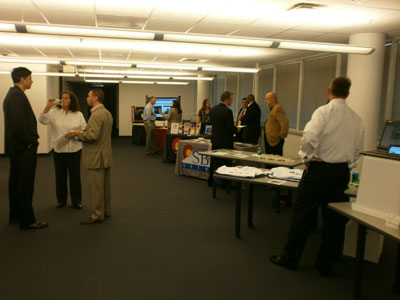The Association of Veteran Entrepreneurs (AVE) hosted a networking event Monday posing the question, “Why are veterans excellent entrepreneurs?”
As Eric Johnson, Chief Operations Officer of the AVE, believes, being an entrepreneur is “a lot of hard work… there are a lot of qualities you need to stick through to launch a company,” qualities he believe veterans generally possess in spades.
A networking session before the event hosted representatives from many companies and organizations whose areas of expertise included economics, technology, auto loans, networking, start-ups, and commerce. Jefferey Reeves of Reeves Financial Group said that he likes to “guide, mentor, and help [veterans] until they can stand on their own feet again in good times and bad.”
Kim Bishop, promoting the start-up video debate website SPAATS, said he believes that veterans are successful in the entrepreneurial world because they have a “willingness to do [the work] well every time.”
Before keynote began, introductory speaker Daniel McCoy explained that the AVE exists to build a network for veterans, as many who return to the States after wars and service to the military do not have the sort of network back home that other adults do. He says that corporate America is not fulfilling to a veteran’s drive, as they tend to be more independent-minded people. As a result, many of them find entrepreneurship to be a more rewarding experience.
McCoy explained that there are two problems which the AVE seeks to correct – the way the world sees veterans, as people who are only capable of whatever sort of general work the military is doing at the time, and the way veterans see themselves, since veterans often do not recognize the value of their experience.
The two methods McCoy proposed to fix these misconceptions are education and connections. In terms of education, the AVE is working with universities to build education programs so veterans can learn the fundamentals of starting a business. In terms of connections, the Association seeks to connect veterans with their community and new networks, partially through a ninety day boot camp that connects participants to various others in the industry and prepares them to pitch an idea to investors.
On this note, McCoy turned the microphone over to the main speaker of the night, retired Major Thomas Deirlein of Thundercat Technology. Deirlein began his talk by pointing out that although veterans represent less than 5% of the population, they own 13% of all small businesses in the United States, so “in a way, vets are serving America again… not in defense, [but] in the economy.”
Deirlein began his career in the military at West Point, went to Ranger school and became a Ranger and served for several years in the Army before returning home. He attempted to work for an existing corporation before realizing that he was not satisfied with that job. He joined a start-up because he “wanted to build a great company” and once he got started, he said, “It was then I realized I’d never go back.” He spent many years enjoying the success of his start-up before being called back into active duty.
While in the Baghdad, Deirlein noticed the needs and often desperate conditions of the local children and started working to get toys, school supplies, vitamins, and other supplies to them. He continued this venture into a non-profit organization once he returned home. The organization has raised money to perform 40 life-saving surgeries on children in the area. While still in the Middle East, he was shot in the pelvis by a sniper. He was able to return home not long after his recovery and rehabilitation were over, but doctors told him he might never walk again. He has thus far run the Army Ten-Miler and two triathlons.
Such determination to succeed helps make veterans effective in entrepreneurship, but Deirlein was adamant that there are many other reasons which explain their proficiency in this area. He says that military experience teaches trust and a mentality of having to complete the mission despite limited resources and incomplete information. He says that “great entrepreneurs expect loyalty and build loyalty,” which is a skill he believes time in the military helps foster. When asked to boil things down to the basics, Deirlein claims that there are three main qualities he sees in veteran entrepreneurs – leadership, persistence and resilience, and flexibility and adaptability. He believe the latter quality to be especially important, pointing out that “survival of the fittest” does not necessarily mean that the strongest survive. It means that those who are most able to adapt survive, or as his Marine friend put it, “semper Gumby: always be flexible.”
Deirlein’s conclusions on how well-equipped veterans are to succeed in the entrepreneurial world impressed many in the audience, including Commanding Officer Bill Mahoney of the U.S. Navy, who says that he works to teach his students at the Naval Small Craft Instruction and Technical Training School many of the sort of qualities Deirlein highlighted and praised, including leadership and relationship skills that will help them both in and out of the military. The talk left the audience members, veterans and civilians alike with a greater respect and understanding that veterans are capable of doing so much more than just the actions they performed while on duty. Deirlein summed it up when he said, “I think entrepreneurs and small businesses [are] what make America great.”



'Why are veterans excellent entrepreneurs?' has no comments
Be the first to comment this post!